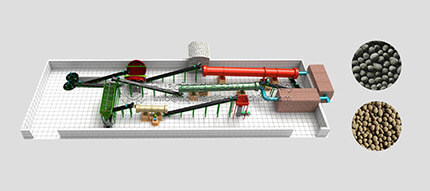Organic fertilizer equipment plant turns domestic sludge into green organic fertilizer
In order to ensure that we all have clean domestic water, almost every city has a sewage treatment plant. However, the domestic sludge produced by the sewage treatment plant has always been a headache for the environmental protection department, because these sludge are rich in a large number of organic substances and pathogenic bacteria, insect eggs, weed species and heavy metal ions, which are easy to produce stench, mosquitoes and flies, and pollute the environment. At present, three treatment methods are mainly used: landfill, reclamation and incineration. The existing treatment methods are easy to cause secondary environmental pollution and waste a large amount of organic fertilizer resources.
Domestic sludge is produced after treatment of domestic sewage. Domestic sewage is produced in toilets, kitchens and bathrooms. Therefore, domestic sludge is "nutritious". The content of organic matter in domestic sludge after bacterial fermentation is generally as high as 50%, and the indicators of nitrogen, phosphorus and potassium are between 5% and 7%, while the content of heavy metals is very low, which meets the basic standard of organic fertilizer and can be used as fertilizer.
After microbial fermentation treatment, domestic sludge can be turned into bio-organic fertilizer through the organic fertilizer production line, which is suitable for trees, flowers, lawns and used as a nursery substrate for tree containers. It has achieved good growth effects, and the physical, chemical and biological properties of the soil have been improved. Thus, the resource utilization of domestic sludge is completely realized.
For the address of the domestic sludge organic fertilizer plant, the overall planning principles are as follows: the raw materials are nearby, the site transportation is convenient, the infrastructure is good, the original buildings are used as much as possible, the investment scale is reduced, the capital use efficiency is improved, and the project demonstration function is fully played. Keep away from residential areas and choose downdraft; Adjust measures to local conditions, compact layout, and try to use the abandoned land: separate the living area from the plant site to maintain environmental sanitation.
The application of bio-organic fertilizer produced by sludge can improve the soil activity and effectively repair the hardening of soil caused by long-term application of inorganic fertilizer: it is conducive to the absorption of crops and the balance of nutrients, and the active bacteria group can greatly promote the effective release of residual nitrogen, phosphorus, potassium and other nutrients in the soil. Using biological fermentation to treat the sludge from urban sewage treatment plants can greatly reduce the pollution of domestic sludge to cities and land. At the same time, the organic fertilizer produced can reduce the application of chemical fertilizers and make agricultural products more environmentally friendly.
评论
发表评论